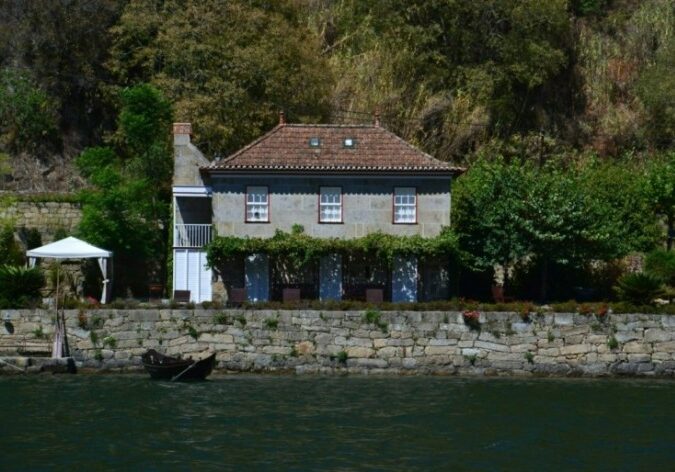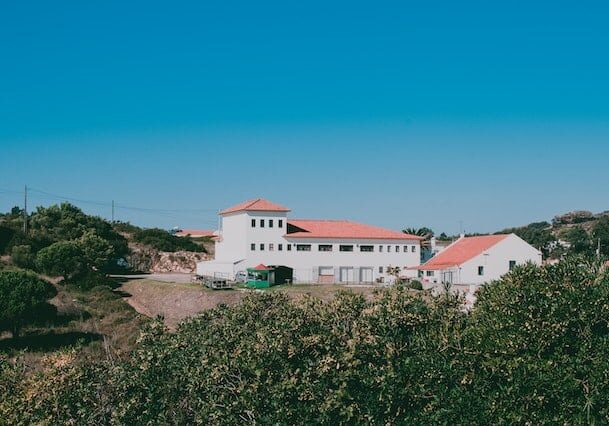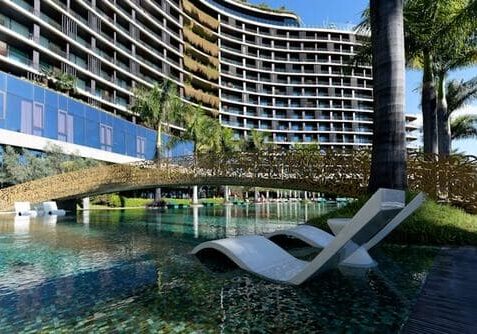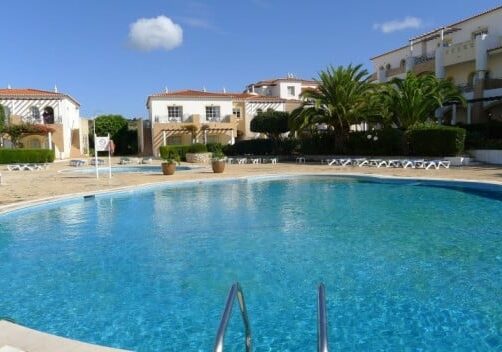Updated: January 7, 2026
The Portuguese real estate market has long presented an alluring opportunity for investors, with the possibility to secure a strong return on investment in many key areas across the country.
If you are considering jumping on the property ladder in Portugal and renting out your Portuguese property in the short term, you must obtain an Alojamento Local (AL) license.
Alojamento Local licenses are issued by the Câmara Municipal (local council town hall) and are required if you plan to rent your property out in the short term, for example, as a guest house on Airbnb or booking.com.
In this comprehensive guide, we present a rundown of what an AL License is and how to obtain one, the latest changes to securing an AL license that came into focus on 1 November 2024, and essential practical information for prospective investors to be aware of.
Stick around to read about:
Quick Summary
- Alojamento Local (AL) is a name for an establishment that offers short-term rentals, such as an apartment, house, or room for tourists.
- With an AL license, you can legally list your property on major platforms like Airbnb, Booking.com, and others.
- You must pay taxes in Portugal for the income you earn from AL.
- Recent changes in the law have made AL licenses transferable with the sale of the property, which is a big advantage.
What is Alojamento Local in Portugal?
The Alojamento Local (AL) is a regulated legal form of temporary accommodation in Portugal that allows residential properties to be rented to tourists for short-term rentals, and that operates outside the scope of conventional hotel establishments. The AL license is a legal way of providing tourists with an accessible and often more immersive local experience.
AL accommodations provide temporary, paid accommodation services to tourists without the extensive regulatory requirements of a traditional tourist enterprise, such as a hotel. They include temporary vacation rental properties listed on platforms like Airbnb and Booking.com. These properties are a popular option for tourists and travelers searching for short-term stays and are a significant part of the tourism industry in Portugal.
AL can be operated in four property types:
- Moradia (House): A standalone building.
- Apartamento (Apartment): A unit within a building.
- Estabelecimento de Hospedagem (Accommodation Establishment): Renting multiple bedrooms, up to a maximum of nine rooms and 27 guests, located in independent units.
- Quartos (Rooms): You can rent out a maximum of three rooms.
Operating an AL is subject to specific legislation, the most important being Decree-Law no. 128/2014. Investors are required to have this license in order to rent out their property in the short term. The property will need to be registered with the local Câmara Municipal (Municipal Council) and have Civil liability insurance (seguro de responsabilidade civil).
In short, AL establishments are those that provide lodging services, with the requirements being that:
- The establishment is furnished and rented out to tourists.
- They are temporary accommodation, with a maximum of 30 days permitted.
- They should not meet the requirements of tourist enterprises (such as hotel establishments, tourist apartments, tourist villages, or tourism developments for housing, or rural tourism).
 Types of Alojamento Local in Portugal
Types of Alojamento Local in Portugal
AL accommodations can be the following types:
- Apartment (Apartamento)
- Villa (Moradia)
- Lodging Establishment/Hostel (Estabelecimento de Hospedagem/Hostel)
- Rooms (Quartos)
No matter the property type, it must include a kitchen for guests to prepare their own meals, a bathroom (even if it is a shared bathroom), and at least one bed.
Background of the AL License Portugal

After six years, a separate legal framework came into force for the operation of AL establishments under Decree-Law No. 128/2014, on 29 August 2014. After this came into force, the AL and short-term rentals began to impact the economy, creating the need for a more specific legal framework.
Key Legal & Regulatory Requirements for AL License

- Article 2: “Local accommodation establishments” provide temporary accommodation services, namely to tourists, for remuneration, and that meet the requirements established in this decree-law.
- Article 4: AL establishments need to be furnished and equipped. They are offered to the general public, and in addition to providing a place to sleep, complementary services, such as cleaning, are provided for periods of less than 30 days.
Though it is initially straightforward to obtain an AL license in Portugal, regulations presented under the Mais Habitação (More Housing) Package (officially referred to as Law No.56/2023) in 2023 heightened the challenge for Portuguese investors seeking to leverage the nation’s thriving tourism industry by renting out their apartments on a short-term basis. However, as of 1 November 2024, many of these restrictions were revoked.
Alojamento Local Legislation & Regulations 2024

- Nationwide transferability: AL licenses can now be transferred across all regions, including previously disputed areas.
- Simplified approval process: Getting approval from the Condominium is no longer required.
- Renewal requirements: Existing licenses no longer have to be renewed every five years.
- Enhanced municipal powers: Municipalities now have the authority to approve an administrative regulation regarding AL activities in their respective territory. Municipalities with more than 1,000 registered accommodations are subject to a one-year deadline (counted from the day they reach 1,000) to declare whether or not they will exercise this power to establish regulations. They must also create housing regulations by 31 October 2025. To guarantee the effectiveness of the municipal regulation, municipalities may, by a reasoned resolution of the municipal assembly and upon proposal by the municipal council, suspend authorizing new registrations in specifically designated areas for a maximum period of one year until the regulation comes into force.
- Local lodging ombudsman: A local lodging ombudsman was established on a municipal level. They will now assist in managing disputes among residents, owners of AL establishments, and condominium owners or third parties, evaluate complaints, and provide recommendations on the operation of ALs
What are the capacity limits of an Alojamento Local?
Properties can host up to 9 rooms and 27 users, except for “rooms” and “hostel” types (previously allowed up to 30 users). If establishments can accommodate more, they will need to install convertible or supplementary beds as long as the total does not exceed 50 percent of fixed beds.
Benefits of Alojamento Local in Portugal for Investors
Many investors are exploring Alojamento Local investment in Portugal due to the country’s strong tourism market. Here’s why:
- You can maximize occupancy at high prices during peak season.
- You can choose between personal use or vacations, simply by blocking off the dates when the property isn’t for rent.
- You can increase the property’s market value for a future buyer by transferring the AL licenses after you sell your property.
- You can tap into Portugal’s booming tourist industry by posting your property on platforms like Airbnb and Booking.com.
 Financial advantages & ROI
Financial advantages & ROI
In 2025, tourism in Portugal is expected to increase by 9 percent. The country welcomes millions of visitors and investors, which boosts the demand for vacation accommodations.
Properties in emerging neighborhoods outside restricted zones in Porto and Lisbon can yield 6 percent to 10 percent annual returns. Popular locations for investors include Campanhã (Porto), making a Marvila real estate investment (Lisbon), or investing in Vila Nova de Gaia (Porto area).
You can expect high gross rental yields with an Alojamento Local license in Portugal. Most owners increase the occupancy rates to 90 percent or more during peak season. If you decide to sell later, you may also benefit from capital appreciation as the property’s value increases over time.
 Lifestyle & residency benefits
Lifestyle & residency benefits
Owners get complete control over their asset. You can manage the maintenance, cleaning, and pick your guests to ensure the property stays in excellent condition.
A buyer’s agent like Goldcrest offers full property management services for long-term rentals, including marketing, booking, and guest services. This approach provides a “hands-off” investment for every owner, ensuring stable, year-round returns in tourist hotspots.
Process Before Asking for a Alojamento Local License

AL license Lisbon restrictions were put in place due to oversaturation. For example, in Santa Maria Maior, almost 69 percent of all housing is given to AL.
Municipal regulations may reintroduce restrictions, validity, and limits on the transfer of licenses. To preserve the social reality of certain neighborhoods and locations, the new decree-law states that municipalities can approve containment areas and sustainable growth areas, by parish or union of parishes, in part or as a whole, where securing a new AL will not be possible.
- Containment areas are defined as areas where the number of accommodation establishments is so great that restrictions on the installation of new establishments are justified.
- Sustainable growth areas are defined as areas where special monitoring and oversight measures are warranted to prevent overloading.
Note: These areas need to be supported by specific studies and reassessed every three years, allowing limitations on new registrations and their transfer as “villa” and/or “apartment”.
The new rules allow for the containment and sustainable growth of areas within municipal regulations. Regulations now allow commercial establishments and services to be installed in properties constructed before 1951, provided they meet certain legal requirements. Under the new regime, municipalities oversee AL rules, removing the authority previously held by parish councils.
Obtaining an Alojamento Local Portugal Real Estate License
So, you have a lovely modern apartment in Portugal and want to make a little extra cash on your investment. Perhaps you’re only in the property for part of the year and want to rent it as a guest house while not in the country? As we’ve mentioned, you must obtain an Alojamento Local license.
Registration and Licensing

Note: Properties held by a company need to have a rental agreement in place with the individual. This is a requirement for the property to operate as a rental business. Working with a legal entity can help in this regard and ensure you adhere to the legal framework in place for short-term rentals in Portugal. Register a new service provision activity through the Tax Authority Portal or the physical Tax Office.
It is not as tricky as you may first imagine to register your AL license in Portugal.
- Firstly, you must register your business activity with Finançes (Portuguese Tax Office). You can register a new service provision activity through the Tax Authority Portal or at the tax office.
- Secondly, submit your AL registration to your local Câmara Municipal. To register for the National AL Registry, simply visit the gov.pt website and submit the required documents (see the section below for the documents you must present). AL license Portugal registration processing can take up to 60 working days (approximately 3 months), though some municipalities process faster.
- Register for AIMA for guest reporting.
- Set up tourist tax collection, if applicable. This tax is required in certain municipalities, such as Lisbon, Porto, the islands, and a few other locations.
- Register on the Livro de Reclamações (Complaint’s Book) website.
AL owners must also register with SIBA to report guest stays, ensuring compliance with immigration regulations. The official registry to verify Al Licenses can also be found here: RNAL Database.
Alojamento Local Required Documents

- Proof of business activity registration for tax purposes with the CAE 55201 or 55204
- Caderneta Predial (Registration Certificate) for the property
- A simple copy of the identification document of the person responsible for the establishment.
- Responsibility statement (Termo de Responsabilidade)
- A simple copy of the rental agreement or other document that legitimizes the operator’s right to conduct the activity
- Minutes of the condominium assembly authorizing the installation, in the case of hostels
- Civil liability insurance (Seguro de Responsabilidade Civil)
- Personal identification
- Insurance documentation
- Licença de habitação (Habitation License). Note for properties pre-1951, this document will be the Certidão de Isenção.
If you are a non-resident, you will need to have a fiscal representative in Portugal who is registered for IVA (VAT). They can be an accountant or a specialized company.
After prior communication, an inspection will be carried out. During this time, the Mayor can also oppose the license. After this, the activity is open to the public.
General Requirements of an Alojamento Local Property

- The internal and external premises need to be maintained and in good condition, and an adequate standard of cleanliness and hygiene must be maintained.
- The cleaning of the premises, including changing bed linen and towels, needs to take place at least once per week or whenever there is a new guest.
- There needs to be a private system with a controlled water supply, or the premises must have mains water connected.
- The premises need to be supplied with both hot water and cold water.
- The premises need to be linked to the main municipal drainage system or have a septic tank adequate for the number of guests.
- The premises must have one private bathroom with a toilet, wash basin, and shower/bath for every three bedrooms.
- Each private bathroom needs to have a secure lock system to ensure the privacy of occupants.
- Each room that is to be occupied by a guest needs to have a window or balcony with direct access to the outside so that there is adequate ventilation.>
- Each room that is to be occupied by a guest needs to have a means of blocking external light.
- Each private room to be occupied by a guest needs to have a locking system to ensure the privacy of occupants.
- The premises must observe general rules regarding fire safety. There must be an adequate number of fire extinguishers and a fire blanket accessible. The national emergency number for Portugal (112) needs to be displayed clearly.
- Noise rules should be clearly visible.
- The premises need to have adequate first aid equipment that is accessible and provide instructions for the domestic appliances.
- Any commercial documentation, publicity, or marketing materials on the premises need to show the name of the premises followed by “Alojamento Local” or the letters “AL”, alongside the AL Registration Number.
- The premises are required to have a complaints book. This should be kept where guests have easy access to it and should include a notice to that effect.
- There should be an information book in four languages.
What price should you charge for your Alojamento Local?
You should indicate the average price per night clearly. You can look at room deals for similar properties on the market and seek expert advice to determine the price you should set, which may vary depending on location, the season, etc. Also factor in additional and fixed costs. Make sure to add your unique value offer and why potential guests should choose your accommodation.
Taxes and Financial Considerations
It’s crucial to keep track of your AL tax obligations as a landlord renting out your property short-term. Below, we outline the key taxes and financial considerations you’ll need to keep in mind. We can’t stress enough the importance of working with experienced tax accountants to ensure you understand and keep up to speed with your tax payments.
 Income tax
Income tax
AL income is taxed differently based on residency and location:
- Residents: Regular AL income taxed at personal income tax (IRS) rates on 35 percent of gross rental income.
- Non-Residents: Flat 25 percent tax on 35 percent of gross rental income.
- Contention Areas: Higher taxation, with 50 percent of gross income subject to tax instead of 35 percent.
- Estabelecimento de Hospedagem (Lodging Establishment/Hostel): A more favorable tax rate applies, with tax levied on only 15 percent of gross income.
 Accounting options
Accounting options
Depending on how the activity will be carried out, the procedure for starting the activity differs: You have two regimes, the simplified regime and organized accounting.
- Simplified regime: Common for small-scale AL operators (1-2 properties), this regime taxes 35 percent of gross income, with an automatic 65 percent expense deduction. No additional deductions are allowed.
- Organized accounting: Required for higher-income operators and those preferring full expense deductions. The tax applies only to net profit, but an accountant is required, increasing administrative complexity.
Essential information about accounting options
- If you intend to operate under the simplified accounting regime, you can proceed with the Start of Activity online or in person at a Tax Office or Citizen’s Shop.
- On the other hand, if you choose organized accounting, the Start of Activity needs to be carried out by a certified accountant.
- If you wish to set up a company, the Start of Activity is preceded by the creation of the company.
- If the expected annual turnover is greater than €200,000, you will need to opt for organized accounting, while if the expected turnover is less than €200,000, you can choose between organized accounting or the simplified regime.
 VAT (IVA) Regime Considerations
VAT (IVA) Regime Considerations
Taxpayers who choose to operate as self-employed workers under the Simplified Regime may opt (if they qualify) for the VAT exemption regime, under Article 53 of the VAT Code (CIVA).
- For Continental Portugal: 6 percent
- For the Azores and Madeira: 4 percent
If they do not invoice more than €15,000 with self-employed work, they may opt for the simplified regime.
Simplified regime + turnover below €15,000 = It does not charge VAT to its clients, but it also does not deduct VAT from its expenses.
Given the specifics of Local Accommodation:
- Pay VAT (the VAT charged to customers) at a rate of 4 percent or 6 percent
- Deduct VAT (the VAT recovered from expenses) in many cases at a rate of 23 percent
It is always a good idea to do some calculations before making a decision, especially if significant investments are expected in the early stages of activity. We also highly recommend working with a trusted accountant to ensure everything is in order.
Tax base
- In the case of IRS: Taxation is applied to 35 percent of the revenue for types A and B (House and Apartment) and 15 percent of the revenue for type C (Accommodation Establishment).
- In the case of IRC (Corporate Income Tax): Taxation is equally levied on 35 percent (types A and B) or 4 percent (type C) of the revenue.
- More recently, a third possibility of incidence was introduced: 50 percent for AL establishments located in restricted areas.
 IRS Categories
IRS Categories
The income from Local Accommodation can be declared under Category B (business and professional income) or Category F (property income). But which option is better?
The better option depends on the specific circumstances, but generally, Category B is preferable for those with higher expenses, while Category F may be more advantageous for those with fewer expenses or who prefer a simpler tax calculation. Below, we provide you with an example of each.
IRS Category B
To provide you with an example of Category B. If, in the year 2024, you earned €10,000 from your Local Accommodation, which is a house, the calculation would be €10,000 x 0.35 = €3,500, the amount that will be taxed under Category B.
The income from the Local Accommodation is, by definition, classified under Category B and taxed according to the applicable proportional rate, depending on the taxpayer’s total income.
However, the property owner can choose, in the IRS declaration, to tax this income according to the rules of Category F.
IRS Category F
If the taxpayer opts to tax the income from Local Accommodation under Category F, the tax calculation works differently. Instead of applying a fixed coefficient as in Category B, the tax is based on the actual income, i.e., the total revenue minus eligible expenses (e.g., property maintenance, condominium fees, IMI, stamp duty, municipal taxes, etc.). The resulting amount is taxed at a fixed rate of 28 percent, regardless of the amount.
For example, if, in the year 2024, you earned €10,000 from your Local Accommodation (which is a house) and you had €3,000 in eligible expenses, the calculation would be: €10,000 – €3,000 = €7,000, the amount that will be taxed under Category F, and then €7,000 x 28 percent tax = €1,960.
This means that you will never pay more than 28 percent tax on this income, unlike Category B, where the rates can reach up to 48 percent.
 Main tax obligations
Main tax obligations
You will need to issue invoices on the Tax Authority Portal or through certified software.
- If you do not issue the invoice directly on the Tax Authority Portal, you must submit it monthly to the Tax Authority (via the SAFT file) by the 5th of each month for the previous month.
- Submit the periodic VAT return (if not exempt)
- Submit Model 30 (income paid to non-residents)
- If you do not have the RFI21 form from the entities to which you make payments (e.g., Airbnb and Booking commissions), you must apply a 25 percent withholding tax.
A further note on VAT (IVA)
- 6 percent VAT applies to accommodation services.
- 23 percent VAT applies to separate services like cleaning.
- Registration is mandatory if annual AL income exceeds €15,000.
- VAT paid on expenses (utilities, furniture, etc.) can be deducted, with refunds available after 12 months.
- Quarterly VAT declarations are required, with late submissions incurring penalties starting at €25.
 Capital Gains Tax (CGT)
Capital Gains Tax (CGT)
AL owners must be aware of the Capital Gains Tax when selling.
- You must wait three years after canceling your AL license to avoid higher Capital Gains Tax. If selling 3+ years after canceling an AL license, you will be taxed at an IRS rate on 50 percent of the gain
- For properties used as AL within the last three years: Tax is calculated on 95 percent of the gain, with no expense deductions.
- For non-AL properties: Tax applies to 50 percent of net gain, with eligible expenses deductible. There is no residency requirement to live in the property during the waiting period.
 Social Security Contributions
Social Security Contributions
AL income from Apartamentos (apartments) and Moradias (villas) is exempt from social security if it is the property owner’s sole source of income. If the owner has other sources of income, social security contributions may apply, with contributions based on relevant income quarterly declarations.
 Tourist Tax
Tourist Tax
Whether visitors need to pay tourist tax will vary depending on the municipality, but, usually, this is around €1 to €2 per night, but can go up to €4, with a maximum of five to seven nights). There are also some age exemptions also applying. For example, children under 16 years of age are often exempt.
Tourist tax is sometimes collected automatically from online platforms, while others will require manual collections, so be sure to check this. You must register the tourist tax with the municipality systems and keep accurate records.
Tourist tax in specific regions of Portugal
As we’ve mentioned, several locations in Portugal require tourist tax to be paid, including Lisbon, Porto, and the autonomous islands of Madeira and the Azores.
To provide you with a few examples, in Albufeira, in the Algarve, there are seasonal applications from 1 April to 31 October each year, with collection through the 360 City platform, with guests paying directly through the platform through a QR code.
In Loulé, in the low season (November to March), the tourist tax is €1 per person per night, which increases to €2 per person per night in the high season (April to October), with the maximum being five nights. Also, there is an exemption for under-16s.
Make sure to keep up to speed with whether your tenants need to pay tourist tax. For example, in Nazaré, on the Silver Coast, a new tourist tax was recently announced and is pending implementation, as is also the case for Coimbra.
For specific services related to the Algarve, you can also see our guide: Algarve, Portugal, Property Management.
Property Management

Management companies typically seek a commission of around 20-30 percent, plus VAR. For mid-term rentals (more than three months), many consider a reduced commission of 5-7.5 percent, with it usually possible to negotiate based on the services required.
Standard services include:
- Booking management
- Cleaning and maintenance
- Handover of the keys to the tenant
- Local support
- Registration with AIMA
- Tourist tax collection
- Issuing green receipts
- Some companies may also offer revenue management
Guest management
- You (or your property management company) must register non-Portuguese guests with AIMA within three days.
- Only guests who are not Portuguese citizens need to be registered.
- Register check-in data immediately for longer stays and update the check-out date as soon as it is known.
- Maintain accurate records of guests.
- Collect and report tourist tax (if applicable).
- Provide emergency contact information and precise contact details for guests about whom to contact in case they require assistance.
- Have clear check-in and check-out procedures. Ask your guests about their expected arrival and departure times so you can plan accordingly.
- Display house rules and local information.
- Have a special requests box (if desired), as going above and beyond will lead to very positive reviews and higher tenant occupancy in the long run.
Property-set-up recommendations
- Having a fridge with a freezer compartment is recommended.
- Having an anti-bed bug mattress protector is essential.
- Get professional photography for marketing and listing purposes.
- A standard power supply (10.25kVA) is usually sufficient.
- Consider separate electrical circuits for high-consumption appliances.
Property Setup Recommendations
- Having an under-counter fridge with a freezer compartment is highly recommended.
- Anti-bed bug mattress protectors are essential.
- Professional photography is crucial for listings and marketing purposes.
- A standard power supply (10.25kVA) is usually sufficient.
- Consider separate electrical circuits for high-consumption appliances.
Alojamento Local Portugal: Best Practices and Tips
Below we share some top tips and best practices to ensure that you get the most of your investment and that you avoid running into any legal or financial troubles.
Business management
- Consider using an accountant to ensure that you understand all your financial responsibilities and make the necessary payments.
- Keep separate business bank accounts to keep everything well organized and keep track of each bank transfer.
- Consider the recent updates to the local accommodation tax in Portugal and the payment deadlines.
- Monitor regulatory changes regularly.
- Commit to regular financial reviews (with your accountant if you have one).
- Track expenses carefully.
Risk management
- Screen guests carefully
- Document the property’s condition and any works that may be needed
- Maintain adequate insurance
- Build good relations with your neighbors
- Carry out regular property inspections
- Have an emergency contact list
- Have a strong local support network in case something happens when you are not available.
Rental contracts
- For short-term rentals under Al, use a prestação de serviços de alojamento local, while for mid- and long-term rentals, use a contrato de arrendamento por fins transitórios. There is no minimum duration requirement for mid- and long-term rentals.
AL License Transfer Process
The AL License transfer process can be done:
- Online with Chave Móvel Digital
- In person at the Câmara Municipal
The documents that you will need include:
- A copy of ID/passport
- Property tax document (Caderneta Predial)
- Business activity registration
- Licença de Utilização (for post-1951 buildings)
- Copy of your AL insurance policy
Other Factors to Consider Regarding Your AL Property

- Leave a place for guest reviews online to attract tenants. Feedback from real guests provides valuable information to individuals looking for short-term rentals.
- If there is free parking nearby, specify this, as it will be useful information for verified guests arriving by car.
- Consider whether you will have free cancellation, if you will have paid reservations, and when you will collect the payment from your guest.
- If you have free wifi, specify this.
- If you have a double bed or king-sized bed, specify this alongside the pictures. Also specific if you have extra beds.
- If there is a private bathroom or an en suite private bathroom, make sure this is clear, as it can be important information for potential guests.
- Make it known that the property has non-smoking rooms and indicate this clearly to guests.
- Ensure an easy process for accepting guests to stay in the property and make sure that the check-out process is clear.
- Ensure that safety measures are all in place and such guidelines are followed to the letter (e.g., the property ensures adequate ventilation, fire safety, first aid, the security system, and emergency number information is displayed clearly), and that you clearly state the maximum capacity of people that can stay in your property. Government guidelines exist for the safety of the guests.
- Direct communication between the guest and you, the owner, or your property management company will ensure that problems are solved as quickly as possible.
- Online travel booking is now the norm, so ensure that your listing is appealing to potential guests. If you have a swimming pool, beverage service, coffee machine, or other notable amenities, facilities, or related services on your property, you can include them on your listing. You can also add in laundry or other services you can provide, for an additional fee. It can also be a nice, personal touch to have a bottle of Portuguese wine and water ready when tenants arrive, as the little touches can go a long way in getting good reviews.
- Indicate useful services and information for guests, such as excellent restaurants nearby, how to get to the city center, popular landmarks, etc.
Insurance and Safety

One ALEP membership can cover multiple properties, although additional properties require a small supplement (under €40 each). ALEP insurance covers up to €75,000 for guest liability only.
The holder of the local accommodation operation must enter into, and maintain a valid non-contractual civil liability insurance policy that covers property and non-property damages caused to guests and third parties, arising from the provision of accommodation services. The minimum capital for the insurance contract is €75,000 per incident.
Alongside public liability insurance, additional recommended coverage includes:
- Regular property/building insurance (multirisco)
- Property damage
- Contents insurance
- Loss of income coverage
- Earthquake coverage
- Alternative accommodation coverage
It’s important to note that having adequate insurance is now strictly enforced. For example, ASAE suspended an AL in Olhão for not having mandatory insurance.
Recommended insurance brokers:
- Abbeygate Insurance – Provides tailored insurance for AL properties
- Zurich Insurance – Provides ALEP-affiliated insurance
Safety Equipment Requirements
As we’ve mentioned, you will be required to have the following safety equipment to rent out your property short-term. You will also need to make sure you carry out regular maintenance checks.
- Fire safety equipment, including a fire extinguisher(s), a fire blanket, smoke/carbon monoxide detectors, and emergency lighting
- A first-aid kit
- Emergency information and safety signage that is clearly displayed
Online Platforms and Marketing
When it comes to advertising your property, online platforms will differ in terms of commission. Below, we outline what you can expect from two of the most popular online platforms.
 Airbnb
Airbnb
- Airbnb is now a world leader when it comes to group and solo travelers seeking an easy accommodation experience
- Airbnb takes a 3 percent commission when listing the property directly without a channel manager
- If using the channel manager or property management software, you can expect Airbnb to take a 15 percent commission.
- Airbnb handles tourist tax collection in some municipalities.
- AirCover damage protection
 Booking.com
Booking.com
- Booking.com takes a 15-20 percent commission
- Booking.com has different payment collection options, and you can set damage deposit requirements
- Booking.com, as with Airbnb, now collects tourist tax in some municipalities
- Booking.com monitors combined discounts, for example, from Genius, the Booking.com Loyalty Program, and weekly stays.
 Platform Management Tips
Platform Management Tips
If you are marketing your property on various online platforms, we recommend maintaining consistent pricing across the different platforms. Alongside this, keep the following in mind:
- Respond promptly to inquiries.
- Keep calendars synchronized across platforms.
- Focus on gathering positive reviews as this will create a positive feedback loop and ensure you constantly attract tenants throughout the year.
- As we’ve mentioned, invest in professional photography to advertise your property.
- Set clear house rules, such as noise restrictions at night, and have an accurate list of amenities.
 Channel managers
Channel managers
If you are seeking out channel managers, some popular options are:
- Guesty
- Lodgify
- Your Porter
- Talkguest – Highly recommended channel manager with SIBA integration and with invoice management
- Octorate – Alternative channel manager with AI-powered communication
Record Keeping

- Guest identification and registration
- Tourist tax payments
- Maintenance and repairs
- Financial records
- Safety equipment inspections
- Regular digital backups
Regarding guest identification and registration, AIMA requires reporting the details of all foreign guests staying in apartments and hotels within the national territory. You will need to provide the following information:
- Full name
- Nationality
- Date of birth
- Document number
- Document type
- Issuing country of the document
- Country of residence
- Check-in and check-out date
Internet, Utilities, and Key Management
You’ll want to ensure you have good internet and get your utilities in order, working with service providers that you trust.
 Internet packages
Internet packages
When it comes to internet solutions, decide what is best for you and whether you are seeking temporary options, such as a portable hotspot, or a no-commitment contract that will come at a higher cost. You can also shop around for the best option and deal right now.
 Utilities
Utilities
It’s important to consider the following when it comes to utilities to save money over the long run.
- Some areas charge commercial rates for AL properties which can be changed back to residential rates if it is the primary residence.
- Make sure to monitor usage patterns, consider smart thermostats, and think about installing motion sensors for air conditioning control.
 Key management and handover
Key management and handover
When it comes to handing over the key(s) to the new tenant, there are several options: whether you do the traditional key handover in person (or through an agent), use key safes, smart locks, or enlist the help of key management services, such as KeyNest.
Goldcrest is a buyer’s agent that is based in Lisbon. We provide expert, impartial advice on real estate investments and how to buy property in Portugal. From scouting out the perfect property through to property acquisition, we have you covered throughout the process. If you are looking to purchase property in Portugal, don’t hesitate to get in touch. Our team of skilled experts is available to solve all your real estate doubts, helping you with the property search and offering insightful expertise and strategic advice.Goldcrest: How We Can Help You
Why choose Goldcrest?
Frequently Asked Questions about the Alojamento Local Portugal License
What is Alojamento Local law in Portugal?
To rent out your property to tourists in Portugal, you will first need to obtain an Alojamento Local (AL) license.
How do I get an Alojamento Local in Portugal?
Alojamento Local licenses are issued by the Câmara Municipal (local council city hall) and are required if you are going to rent your property out in the short term.
When you are up and running, you can have a look at room deals for similar properties on the market and seek expert advice to determine the price you should set.
What are the main benefits of an Alojamento Local license in Portugal?
The main benefit is that you get to operate legally, which helps you avoid hefty fines. You also get access to booking platforms like Airbnb. The license gives credibility to your rental business and lets you capitalize on Portugal’s strong tourism market.
Can foreigners apply for an Alojamento Local license?
Yes, foreigners can apply for an AL license on the same terms as Portuguese citizens. You must own the property, and the key requirement is obtaining a Portuguese Tax Identification Number (NIF) before starting the licensing process.
What are the Alojamento Local Portugal new rules in 2024?
By giving authority to municipalities to approve the administrative regulation of AL licenses, changes to the More Housing (Mais Habitação) Bill regarding AL licenses that came into force on 1 November 2024 are welcome for property investors looking to invest in short-term rentals in Portugal.
Can I get an AL license for for accommodation in Lisbon?
At the moment, it is not possible to get an AL license for accommodation in Lisbon for much of the city center. New AL holiday homes are currently banned in six parishes and nine neighborhoods for accommodation in Lisbon.
What are the restrictions on new AL licenses in Lisbon?
Lisbon has suspended new AL license registrations in most central, high-density tourist areas like Misericórdia and Santa Maria Maior. As local councils now have greater autonomy, new licenses are generally only permitted in designated ‘sustainable growth’ zones.
How much tax do I pay on Alojamento Local income?
Tax rates vary based on your residency status. Under the simplified regime, the taxable base can be 35 percent of your gross income. For residents, the rates are progressive, while non-residents have flat rates. A VAT may apply if turnover exceeds the threshold.
What if the AL licence application is rejected?
If your Alojamento Local application is rejected, you can ask the council to review it, but only once. You will have to cover the costs of this review and the council inspection that is needed to verify the AL.
